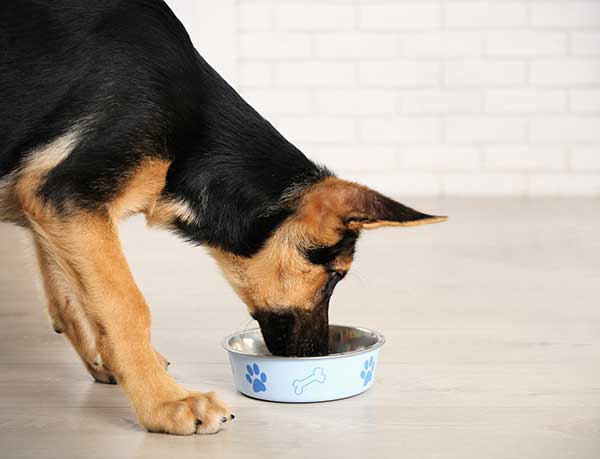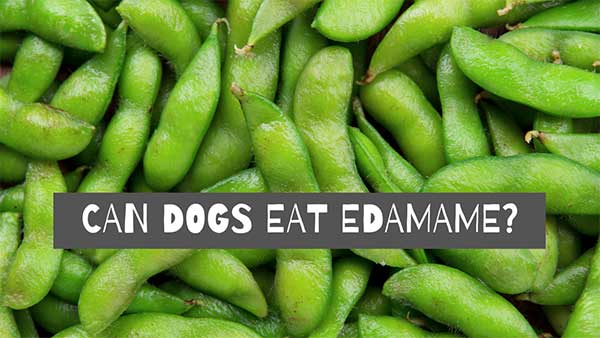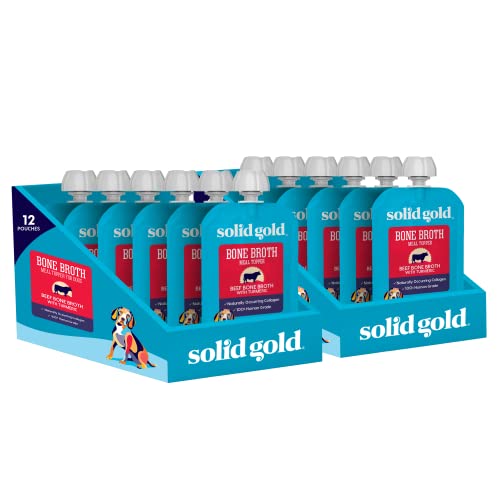Edamame are some of the most nutritious beans out there. They supply the body with various essential vitamins and minerals.
If you’re a fan of edamame and also happen to be a proud dog owner, you must have noticed the curiosity in your dog’s eyes each time you’re snacking on these beans.
Indeed, dogs can be very curious, especially when they’re begging for human foods. The pitiful facial expression that they project is usually all it takes for many people to offer them the food they’re begging for.
But as a responsible pet parent, you should never offer your dog anything that’s nutritionally useless or potentially toxic. And that begs the question, can dogs eat edamame?
Technically, dogs can eat edamame. These beans are loaded with essential minerals and vitamins that your pooch might enjoy, including dietary fiber, proteins, and polyunsaturated fats, to mention but a few. Plus, they don’t present any immediate risks of toxicity.
So, is edamame safe for dogs?
Yes, edamame beans are perfectly safe for dogs. You only need to ensure that you feed the beans to your pooch in moderation. As nutritious as they are, edamame should never replace your dog’s regular diet.
Read on for more insights on edamame and dogs.
More About Edamame
It’s not unusual to come across dog owners wondering to themselves, ‘is edamame bad for dogs and what could possibly go wrong?’
As we’ve already indicated, edamame beans are safe for dogs if fed in small portions. But before we delve deeper into the potential benefits and side effects of edamame for dogs, you could be wondering exactly what these beans are.

Now, you’re probably already acquainted with soybeans. Soybeans are some of the most versatile food crops. The beans can be processed into various food products, including soy protein, soy sauce, soybean oil, natto, tofu, miso, etc.
Interestingly, soybeans can also be consumed in their whole, immature forms; in which case they’re referred to as edamame.
Also known as vegetable-type soybeans, edamame were traditionally popular in Asian countries. But over time, these beans have gained widespread recognition even in the West, where they’re generally consumed as a snack.
Edamame are distinguished by their green color, as opposed to the tan, light brown, or beige color that characterizes most regular soybeans.
What Should Dogs Eat?
Contrary to popular belief, dogs are not carnivores. While animal protein appears to be the most common ingredient in their foods, dogs are actually omnivores. And no, they didn’t acquire their omnivorous traits after domestication by man.
Some of the domestic dog’s wild cousins, such as the wolf and jackal, generally consume meat and wild fruits. That’s already reason enough to offer edamame to your furry friend. Compared to cats, plant-based foods like beans aren’t likely to irritate your dog’s digestive system.
But there’s a caveat. Unlike other omnivorous animals, dogs tend to prefer meat to greens. So even if you must feed edamame beans to your pooch, you should offer him small portions and only as an occasional treat. That’s particularly true if the dog has never been introduced to these beans before.
You might not expect any worrying side effects if you only offer your pooch small portions of edamame. But the equation can change drastically if you allow the dog to consume too much edamame than is his fair share.
- SUPERFOOD INGREDIENTS – This dog bone broth is crafted with carrots, sweet potatoes, apples, pumpkin, and ginger to help promote gut health and…
- SLOW-SIMMERED BONE BROTH – Your pup will love the rich aroma and taste of this slow-simmered bone broth that promotes healthy hydration and provide…
- NATURALLY OCCURRING COLLAGEN – Rich in natural collagen from beef bones, collagen is an essential protein that promotes healthy skin and nails while…
Last update on 2025-01-13 / Affiliate links / Images from Amazon Product Advertising API
Potential Health Benefits of Edamame for Dogs
1. Aid Digestion
The most obvious benefit of plant-based foods for dogs is that they aid digestion, and edamame is no exception.
Generally, half a cup of shelled edamame contains 9 grams of fiber as well as the following nutritional elements;
- 11 grams of protein,
- 120 calories,
- 13 grams of carbohydrate,
- 15 mg of sodium,
- 5 grams of fat,
- 5 grams of monounsaturated fat, and
- 5 grams of polyunsaturated fat.
The same quantity also comes with a host of other vitamins and minerals, including Vitamins A, C, and K, as well as iron, copper, manganese, and calcium.
Dietary fiber plays two fundamental functions as far as aiding digestion is concerned. First, the fiber supplies the nutrients required by your dog’s gut-friendly bacteria. By nourishing these bacteria, dietary fiber helps to protect your dog from digestive diseases.
Secondly, dietary fiber, particularly insoluble fiber, helps in the bulking of your dog’s stool. That’s instrumental in relieving conditions like constipation, indigestion, and abdominal pains.

2. Help With Weight Management
This is another essential function of dietary fiber. Fiber-rich foods like edamame create a sense of fullness for longer.
Mixing edamame beans into your dog’s regular diet will reduce the food portions that the animal consumes, helping to keep his weight in check.
3. Promotes Healthy Coat and Hair
Edamame beans are rich in omega-3 alpha-linolenic acid. This acid is cited for its ability to induce hair regeneration while facilitating the growth of healthy skin.
So, if you ever feel like your dog’s coat is losing its radiance, you can always supplement his diet with edamame. Omega-3 alpha-linolenic acid also plays a crucial role in lowering the risks of obesity and diabetes.
- Works as a dog food topper – For pet parents looking for an alternative to capsules, raw treats, or soft chews, all it takes is a few pumps of Salmon…
- A tasty & body nourishing treat for cats & dogs – Essential fatty acids for a healthy coat.
- Powerful Omega Fatty Acids – This premium fish oil liquid formula is loaded with the healthy Omega-3 fatty acid (with epa and dha) to support health…
Last update on 2025-01-15 / Affiliate links / Images from Amazon Product Advertising API
4. Boosts Immunity
Like all soybeans, edamame are rich in compounds known as isoflavones. These compounds resemble the hormone estrogen and are known to bind weakly to estrogen’s receptors.
Now, high estrogen levels have always been associated with increased risks of certain types of cancer. Studies now indicate that increasing your dog’s intake of isoflavone-rich foods like edamame early in life might lower the risks of cancer.
Isoflavones have also been shown to help reduce bone loss occasioned by osteoporosis.
What’s more – edamame also packs other antioxidants that might work synergistically with isoflavones to reduce the risks of other chronic diseases like heart disease, diabetes, and arthritis.
Side Effects to Watch Out For
Even after highlighting some of the potential benefits of edamame for dogs, you could still be wondering, can edamame hurt dogs?
The reality is that edamame can still hurt your dog. Despite the cocktail of health benefits that edamame present to dogs, the beans might also pose certain risks to your pooch.
If you examine edamame’s nutritional profile, you’ll realize that the beans contain significant levels of fats, sodium, and carbohydrates. While these food elements are generally beneficial in small portions, they can wreak havoc if fed to dogs in large quantities.

For starters, fatty foods are the greatest risk factors for obesity and a host of other lifestyle-related conditions like heart disease. The saving grace, though, is that much of the fat in edamame is the nutritionally beneficial polyunsaturated fats.
Sodium is an essential mineral required by all animals. It promotes various physiological processes, such as potassium absorption and regulation of electrolytes. Sadly, too much sodium can cause sodium ion poisoning in dogs.
The condition manifests in gastrointestinal complications like vomiting and diarrhea, as well as generalized fatigue, excessive urination and thirst sensation, kidney damage, etc. If untreated, sodium ion poisoning could kill your pooch.
Carbohydrates will also benefit your dog in small amounts. In excess, high-carb foods might trigger weight gain, blood circulation disorders, and dental problems.
Even the fiber content in edamame is both a blessing and a curse. If consumed in large amounts, fiber causes a laxative effect. Which may trigger diarrhea and lead to acute dehydration.
Other potential risks of edamame for dogs depends on how you offer the beans to your pooch, particularly the part of the beans that you feed the dog. Like all beans, edamame contains seeds, husks, and pods/shells.
- ACTIONABLE HEALTH INSIGHTS: Test for over 270 genetic health conditions and get actionable insights to help you give your pup the best care possible….
- MOST ACCURATE BREED IDENTIFICATION: Test for over 350 dog breeds including dingoes, coyotes, wolves, and village dogs. Using a research-grade…
- TRAIT INSIGHTS THAT HELP YOU BE MORE PREPARED: Test for 55 physical traits. Size, coat, grooming needs — your dog’s traits don’t just make them…
Last update on 2025-01-13 / Affiliate links / Images from Amazon Product Advertising API
Can dogs eat edamame seeds?
No, you shouldn’t offer edamame seeds to your dog. That’s for the simple reason that the dog may not digest edamame seeds. Also, the seeds might be a choking hazard.
Can dogs eat edamame husks?
Much of the fiber in edamame is concentrated around the husks. So, you can comfortably feed edamame husks to your pooch. But remember that fiber has laxative effects if fed in excess, which means that you should offer edamame husks to your canine friend in small portions.
Can dogs eat edamame pods or shells?
Unfortunately, dogs cannot eat edamame shells. Like edamame seeds, shells can present choking hazards as they’re a bit difficult for your dog to chew and digest.

What’s The Best Way to Offer Edamame to Dogs?
You can serve either raw or cooked edamame to your canine friend. However, experts recommend offering raw edamame to dogs.
By consuming raw edamame, your dog has higher access to many of the nutritional elements in these beans. You only need to wash them properly to ensure that they’re free from soil and debris.
After washing your edamame beans, remove the shells and anything else that the dog may choke on. You can then serve the beans to your pooch as a standalone dish or mix it into his regular food.
So, can dogs eat raw edamame?
Yes, dogs can eat raw edamame. In fact, experts actually recommend feeding dogs raw as opposed to cooked edamame.
But if you’re averse to the idea of serving raw edamame to your dog, there’s no need to fret. You can still feed cooked edamame to your furry friend.
One of the best things about edamame is that there are numerous ways to prepare the beans. You can boil, steam, bake, fry, roast, or microwave them. However, not all of these methods of preparation is ideal when it comes to edamame for dogs.

Can dogs eat steamed edamame?
Steaming and boiling are some of the best ways to cook edamame for dogs. These methods ensure that a significant portion of the nutrients remains intact. But whether you choose to steam or boil these beans, avoid adding salt, fat, garlic, or any other food ingredients that are generally considered harmful to dogs.
Can dogs eat dry roasted edamame?
Yes, they can. However, avoid feeding your dog dry-roasted edamame that contains too much salt or pepper.
Can dogs eat fried edamame? Not recommended. Fried edamame is way too fatty for dogs.
Can dogs eat baked edamame?
Baked edamame is discouraged for dogs since it undergoes processes that make it almost nutritionally useless for them. Plus, many of the ingredients used, including flour, spices, and butter, are potentially harmful to dogs.
Can dogs eat frozen edamame?
Your concern shouldn’t be the edamame but other food ingredients that comprise frozen edamame. Particularly keep your eyes out for toxic ingredients like spices.
- Crafted with Fresh and Raw Ingredients: Matches the natural diets and physiology of dogs to best meet their natural nutritional needs
- Made in the USA: Formulated in our state-of-the-art Kitchen using only ingredients from trusted sources; Packaging may vary
- Grain-Free and High-Protein: High in protein and full of key nutrients with fresh or raw animal ingredients, whole vegetables, fruits, and botanicals
Last update on 2025-01-18 / Affiliate links / Images from Amazon Product Advertising API
How Much Edamame Can Dogs Eat?
Throughout this article, we’ve indicated that dogs should only eat moderate amounts of edamame. However, the term ‘moderate’ can be a bit fluid for most dog owners.
As you shall find, how much edamame for dogs is safe depends on various aspects, such as the dog’s size, body weight, as well as tolerance and sensitivity to edamame. If your dog has never been introduced to edamame, begin by offering him 1 or 2 beans and observe his reactions to the beans.
You’ll know almost immediately if a dog is intolerant to edamame if he exhibits any of the following symptoms;
✔ Gastrointestinal complications like nausea and vomiting, diarrhea and dehydration, and abdominal discomfort,
✔ Allergic reactions such as sneezing, coughing, teary eyes, dilated pupils, and generalized irritability,
✔ Inability to eat or drink normally.
Even if your dog doesn’t present any side effects after eating edamame for the first time, do not increase the portions drastically. Instead, give the dog’s digestive system ample time to familiarize itself with the new food. In the long run, it will be easier for your pooch to consume up to 10 pieces of edamame in one sitting without experiencing any side effects.

Conclusion
Edamame are some of the most nutritious beans out there and they’re as beneficial to dogs as they are to humans. But when it comes to edamame for dogs, the conventional wisdom is to experiment with smaller portions to avoid your pooch experiencing any adverse effects.
Most importantly, remember to offer edamame to your dog only as an occasional treat. You might also consider consulting your vet before incorporating edamame into your dog’s diet.
Checkout Our Favorite Dog Products
1. BEST PUPPY TOY
We Like: Snuggle Behavior Toy with Heart Beat & Heat Pack – Ideal toy for new puppies.
2. BEST DOG TRAINING PROGRAM
We Like: Doggy Dan The Online Dog Trainer – Stop any dog problem and raise the perfect puppy with The Online Dog Trainer.
3. Best Multivitamin for Dogs
We Like: PetHonesty 10-For-1 Multivitamin – 10 Benefits in 1 Daily Treat – These Multivitamin Snacks combine a well-rounded blend of the most essential vitamins and supplements including glucosamine, probiotics, vitamins and omegas, for dogs’ overall daily health.
4. BEST DOG PUZZLE TOY
We Like: Outward Hound Interactive Puzzle Toy – Every dog loves chasing squirrels at the park. The Outward Hound Hide-a-Squirrel Puzzle Toy gives your dog the same feeling as though he was outdoors chasing live squirrels.
5. Best Calming Treats for Dogs
We Like: FurroLandia Hemp Calming Treats – These soft chews will calm your dog so it can peacefully endure stressful situations, such as long car trips, visiting unfamiliar places, or hearing Thunder. Ideal for all dog breeds & sizes.






